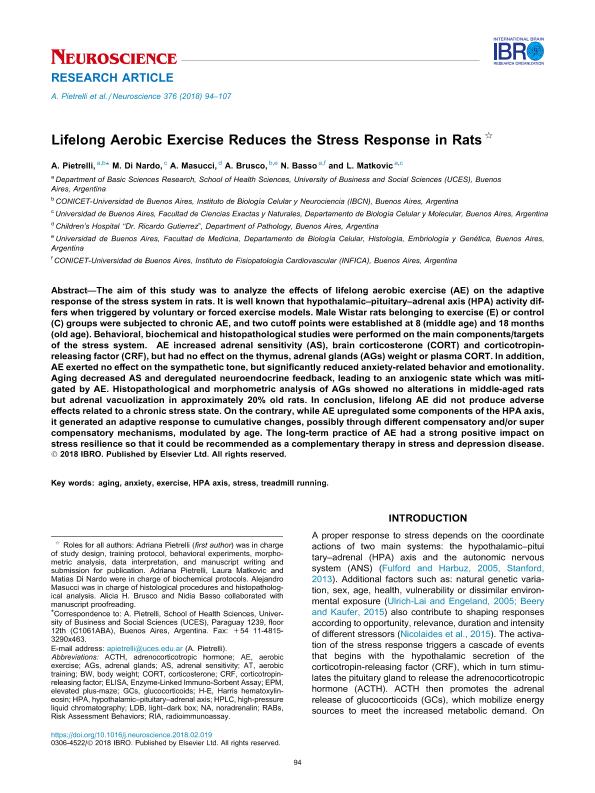Artículo
Lifelong Aerobic Exercise Reduces the Stress Response in Rats
Pietrelli, A.; Di Nardo, M.; Masucci, A.; Brusco, Herminia Alicia ; Basso, N.; Matkovic, Laura Beatriz
; Basso, N.; Matkovic, Laura Beatriz
 ; Basso, N.; Matkovic, Laura Beatriz
; Basso, N.; Matkovic, Laura Beatriz
Fecha de publicación:
04/2018
Editorial:
Pergamon-Elsevier Science Ltd
Revista:
Neuroscience
ISSN:
0306-4522
Idioma:
Inglés
Tipo de recurso:
Artículo publicado
Clasificación temática:
Resumen
The aim of this study was to analyze the effects of lifelong aerobic exercise (AE) on the adaptive response of the stress system in rats. It is well known that hypothalamic–pituitary–adrenal axis (HPA) activity differs when triggered by voluntary or forced exercise models. Male Wistar rats belonging to exercise (E) or control (C) groups were subjected to chronic AE, and two cutoff points were established at 8 (middle age) and 18 months (old age). Behavioral, biochemical and histopathological studies were performed on the main components/targets of the stress system. AE increased adrenal sensitivity (AS), brain corticosterone (CORT) and corticotropin-releasing factor (CRF), but had no effect on the thymus, adrenal glands (AGs) weight or plasma CORT. In addition, AE exerted no effect on the sympathetic tone, but significantly reduced anxiety-related behavior and emotionality. Aging decreased AS and deregulated neuroendocrine feedback, leading to an anxiogenic state which was mitigated by AE. Histopathological and morphometric analysis of AGs showed no alterations in middle-aged rats but adrenal vacuolization in approximately 20% old rats. In conclusion, lifelong AE did not produce adverse effects related to a chronic stress state. On the contrary, while AE upregulated some components of the HPA axis, it generated an adaptive response to cumulative changes, possibly through different compensatory and/or super compensatory mechanisms, modulated by age. The long-term practice of AE had a strong positive impact on stress resilience so that it could be recommended as a complementary therapy in stress and depression disease.
Palabras clave:
AGING
,
ANXIETY
,
EXERCISE
,
HPA AXIS
,
STRESS
,
TREADMILL RUNNING
Archivos asociados
Licencia
Identificadores
Colecciones
Articulos(IBCN)
Articulos de INST.DE BIOLO.CEL.Y NEURCS."PROF.E.DE ROBERTIS"
Articulos de INST.DE BIOLO.CEL.Y NEURCS."PROF.E.DE ROBERTIS"
Citación
Pietrelli, A.; Di Nardo, M.; Masucci, A.; Brusco, Herminia Alicia; Basso, N.; et al.; Lifelong Aerobic Exercise Reduces the Stress Response in Rats; Pergamon-Elsevier Science Ltd; Neuroscience; 376; 4-2018; 94-107
Compartir
Altmétricas



